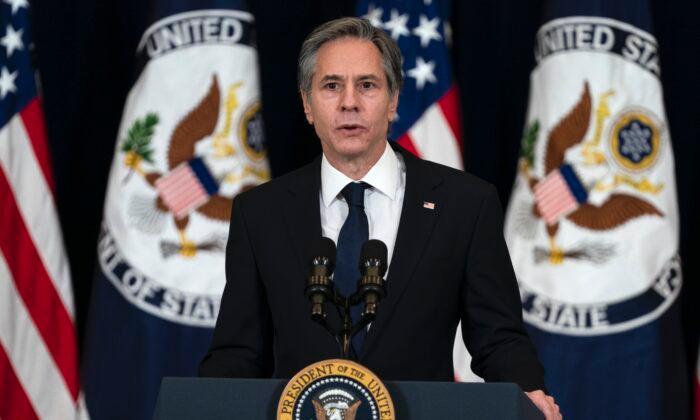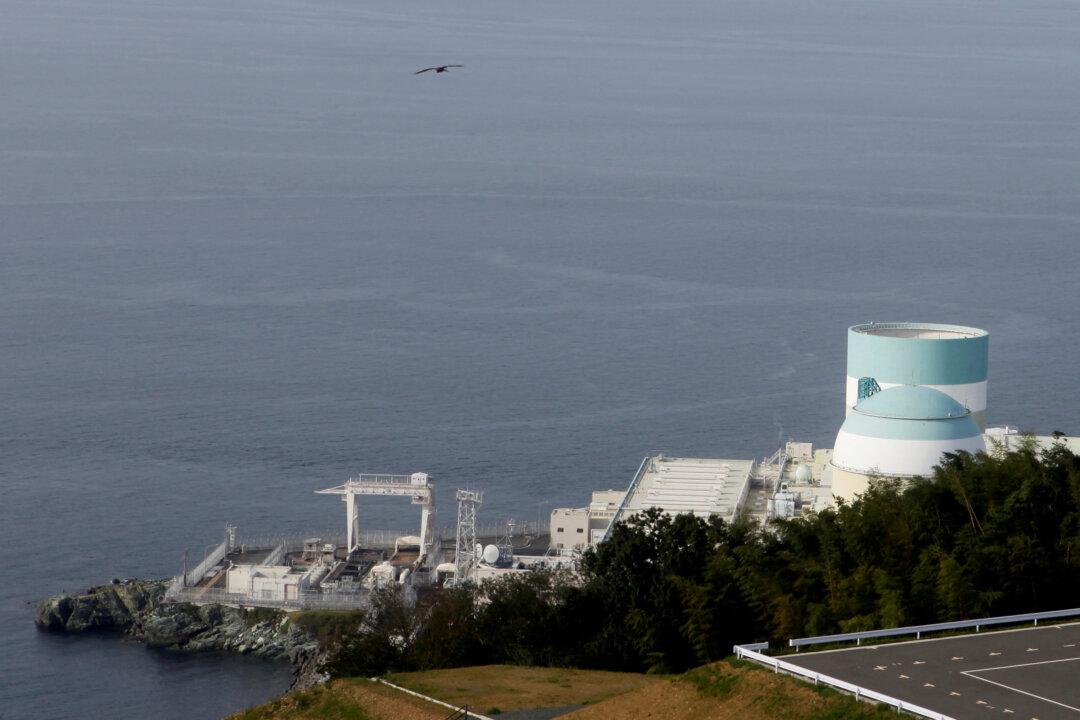PARIS/WASHINGTON—The United States on Thursday said it was ready to talk to Iran about both nations returning to a 2015 agreement that aimed to prevent Tehran from acquiring nuclear weapons, seeking to revive a deal that the Trump administration abandoned nearly three years ago when it criticized the regime’s use of its citizen’s wealth to fund terrorist activities in the region instead of helping the Iranian people.
U.S. Secretary of State Antony Blinken stressed President Joe Biden’s position that Washington would only return to the accord, formally known as the Joint Comprehensive Plan of Action (JCPOA), if Tehran came into full compliance with the deal.
Blinken announced the decision during a video meeting with the foreign ministers of Britain, France and Germany—a group known as the E3—who were gathered in Paris.
“If Iran comes back into strict compliance with its commitments under the JCPOA, the United States will do the same and is prepared to engage in discussions with Iran toward that end,” a joint statement from the four nations said.
Tehran has accelerated its breaches in recent months to produce uranium enriched up to 20 percent and uranium metal, which other JCPOA members have agreed has “no credible” civilian use.
Refining uranium to high levels of fissile purity is a potential pathway to nuclear bombs, although Iran had denied that it its enrichment programme is for developing nuclear weapons.
The top Republican on the House Foreign Affairs Committee, Rep. Michael McCaul of Texas, quickly denounced the steps. “It is concerning the Biden Administration is already making concessions in an apparent attempt to re-enter the flawed Iran deal,” he said. “The Trump Administration created leverage for President Biden on Iran—we should not squander that progress.”
A U.S. official told Reuters that Washington would respond positively to any European Union invitation to talks between Iran and the six major powers who negotiated the original agreement: Britain, China, France, Germany, Russia and the United States.
“We are ready to show up if such a meeting were to take place,” the official told Reuters, after a senior EU official floated the idea of convening such talks. It is unclear whether any talks might occur, let alone when or where.
Responding to the four nations’ statement, the Iranian regime’s Foreign Minister Mohammad Javad Zarif said Washington should make the first move by ending its sanctions.
“Instead of sophistry & putting onus on Iran, E3/EU must abide by own commitments & demand an end to Trump’s legacy of #EconomicTerrorism against Iran,” Zarif said in a tweet.
“Our remedial measures are a response to US/E3 violations. Remove the cause if you fear the effect,” he continued. “We'll follow ACTION w/ (with) action.”
UN Nuclear Watchdog
The Shiite theocratic regime in Tehran has been pressuring Biden to begin reversing sanctions imposed by Trump by next week, warning that it will take its biggest step yet to breach the deal if its demands are not met—banning short-notice inspections by the U.N. nuclear watchdog to stop nuclear activities that have no credible civilian use.Britain, France, Germany, and the United States called on Iran to refrain from that step and repeated their concerns over Iran’s recent actions to produce both uranium enriched up to 20 percent and uranium metal.
German Chancellor Angela Merkel and the president of the European Council spoke with Rouhani this week to try to end the diplomatic standoff. The head of the IAEA is scheduled to travel to Iran this weekend to find a solution that allows the agency to continue inspections.
Iran is “playing with fire,” said German Foreign Minister Heiko Maas, who took part in the talks.
“The measures that have been taken in Tehran and may be taken in the coming days are anything but helpful. They endanger the Americans’ path back into this agreement. The more pressure that is exerted, the more politically difficult it will be to find a solution,” he said.
Iran’s threats are “very worrying,” British Foreign Secretary Dominic Raab said, stressing the need “to re-engage diplomatically in order to restrain Iran, but also bring it back into compliance.”
The diplomats also expressed concern about human rights violations in Iran and its ballistic missile program.
Biden’s officials have offered some conciliatory gestures toward Iran, such as relaxing the travel restrictions on diplomats in its mission to the United Nations that the Trump administration imposed in 2019, which had confined them to a small section of New York City.
The Biden administration has also withdrawn a Trump administration assertion that all U.N. sanctions had been reimposed on Iran in September due to Iran’s “significant non-performance” with its JCPOA obligations, according to a U.S. letter to the United Nations Security Council seen by Reuters.






Friends Read Free